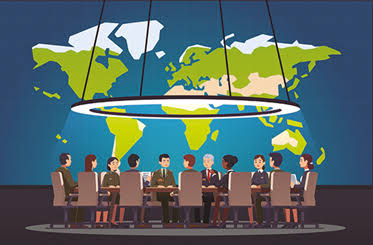Establishing a new global governance

Till less than 300 years ago, India and China led the World not only in GDP but also in each and every field. Once again the growing stature of India and China in leadership role is not simply a geopolitical shift – it is the embodiment of humanity’s collective hope for a world order that respects dignity, diversity and the planet. With support of the rest of the countries of Global South, they will not only be the top Powers of the future of global governance – they will lead it.
Global governance system established in last 250 years is undergoing a major change. With the world becoming more multipolar, the failure of multilateral institutions of 20th century to adequately address 21st-century challenges, and growing mismanagement combined with greed of a few, the dominance of the Global North is declining rapidly. This has accelerated the need of both India and China to lead the Global South and also to accelerate the reshaping of the world order.
For last 200 years, countries across Asia, Africa, Latin America and the Pacific were perceived merely as “ colonies “ to be exploited. Today, they are rising – with vision, capacity and legitimacy – to stand on equal footing with the so called developed countries. This emergence marks a new era of global partnership, one that is more inclusive, multipolar and rooted in justice.
Amid the continuously evolving global geopolitical and economic landscape, the Southern grouping of the BRICS is increasingly asserting its role as a new force driving more inclusive and equitable global partnership.
A major catalyst for the rise of the Global South is the systemic failure of development models arbitrarily formulated and imposed by the Global North. Next the developed countries ( developed with help of the looted Wealth of other countries and massive exploitation of planets environment ) rigidly and arrogantly applied a “one-size-fits-all” model – ignoring the unique histories, cultures and socio-economic realities of the Global South. Global North built on exploitative free-market capitalism, scheming economic liberalization and convoluted procedural democracy which mostly failed to account for the social, historical and cultural contexts of developing nations.
Privatization of public sectors, deregulation and trade liberalization policies, promoted by the International Monetary Fund (IMF) and World Bank through the Western Consensus, have undermined the productive capacities of the Global South. The Western Consensus imposed a policy paradigm on Global South states, mandating structural adjustments that prioritized privatization, deregulation and “trade liberalization” as conditionality for financial assistance. The Western Consensus as an instrument of neo-colonial control, extracted compliance from Global South economies through debt-austerity regimes.
Rather than ushering inclusive growth, these measures have exacerbated dependence on foreign investment and external debt, leaving the Global South with heightened inequality, poverty, and uncompetitive domestic industries.
In response to the shortcomings of Northern-dominated governance, both India and China have been rising with their own methodologies that are collaborative and inclusive. This is reflected in various geopolitical and institutional trends. Countries like Indonesia, Brazil, India and China are now central actors in global diplomacy. Not only are they new economic powerhouses, but they also offer alternative perspectives on global issues ranging from climate crises to digital governance.
India stands as a major power whose growth has been inspiring most of the developing countries in the Global South. India has been the first responder in the Indian Ocean Region and even in the Indo Pacific and on the African continent in any natural calamity. Also India’s dedication to sustainable development harmonizing humanity and nature has appealed to many. Rather than following the conventional growth-at-all-costs trajectory, India and China have demonstrated that development can be both ambitious and environmentally conscious.
The BRICS platform has yielded great benefits for member countries. The combined GDP growth of the eleven BRICS countries have surpassed the global average in 2025. BRICS has now expanded to include Indonesia, Iran, the UAE, Egypt and Ethiopia, representing 50 percent of the global population. This block serves as a pivotal force in rebalancing Western dominance in global economic governance.
Equitable economic development and poverty eradication are core ideals of the Global South. Rather than replicating Western development models, India and China have achieved remarkable success in eradicating poverty, advancing technological prowess and fostering widespread prosperity.
Global South leadership brings a fundamentally different alternative vision of true multilateralism: The global system should reflect a multipolar reality, not the dominance of a single power bloc; inclusive and sustainable development, development focusing on human well-being, social justice and ecological balance; solidarity and equal cooperation.
Cooperation between countries must be based on mutual respect; national sovereignty and collective sovereignty All countries must contribute to the global common interest.




